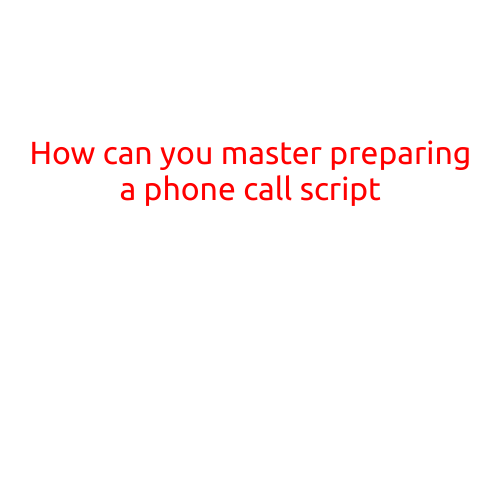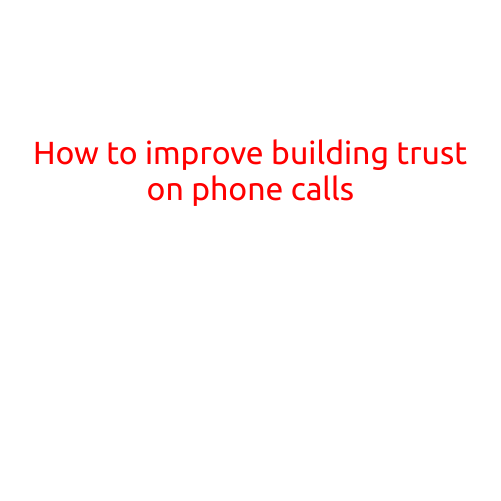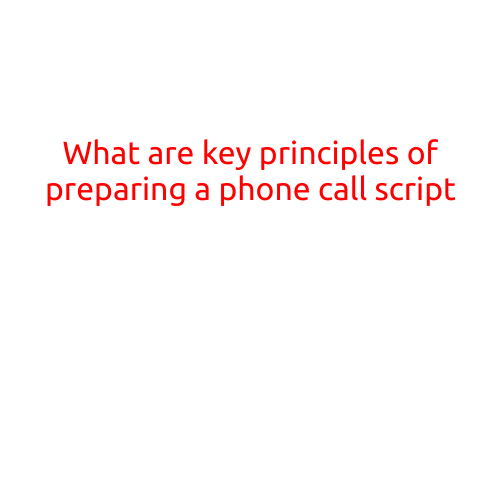
How Can You Master Preparing a Phone Call Script?
When it comes to phone calls, preparation is key. A well-crafted phone call script can help you stay focused, confident, and effective in your communication. A phone call script is a vital tool for anyone who needs to make frequent or high-stakes calls, whether you’re a salesperson, a customer service representative, or a business owner. In this article, we’ll explore the essential steps to help you master preparing a phone call script.
Understand the Purpose of the Call
Before you start drafting your script, it’s crucial to understand the purpose of the call. What do you want to achieve? Are you trying to schedule a meeting, pitch a product, or gather information? A clear understanding of the call’s purpose will guide your script and help you stay focused.
Identify Your Target Audience
Who is your ideal caller? What are their pain points, interests, and concerns? Understanding your target audience will enable you to tailor your script to resonate with them. You can research demographics, buyer personas, or even conduct focus groups to get a better understanding of your audience.
Organize Your Thoughts
Take a few minutes to brainstorm the key points you want to cover during the call. Break down your thoughts into sections, such as:
- Introduction and rapport-building
- Presenting the main message or pitch
- Addressing objections or questions
- Recap and closing
This structure will help you stay organized and ensure you cover all the essential topics.
Use a Conversational Tone
While a script is a guide, it shouldn’t sound robotic or forced. Use a natural, conversational tone to make your script easy to follow and engaging. Avoid using jargon or overly technical language that might confuse your caller.
Keep it Concise
A phone call script shouldn’t be too lengthy or wordy. Aim for a script that’s 1-2 pages at most. Keep your sentences short, clear, and concise. Avoid using unnecessary words or phrases.
Use Positive Language
Use positive and empowering language to put your caller at ease. Avoid negative or apologetic tone, which can create a defensive or anxious atmosphere.
Anticipate Questions and Objections
Think about potential questions or objections your caller might raise. Prepare responses or counterarguments to address these concerns. This will show your caller that you’re prepared and willing to listen.
Practice Your Script
Rehearse your script to ensure you’re comfortable with the content and delivery. Practice in front of a mirror, record yourself, or have a friend or colleague conduct a mock call. This will help you identify areas for improvement and build confidence.
Be Flexible
Remember, a phone call script is meant to be a guide, not a rigid framework. Be prepared to adapt and adjust your script based on the conversation. Listen actively, respond thoughtfully, and be willing to deviate from the script if needed.
Tips for Additional Success
- Use a headset or speakerphone to keep your hands free and reduce distractions.
- Have all necessary materials and resources readily available.
- Use a call tracker or CRM to monitor and analyze your calls.
- Follow up with your caller after the call to confirm or provide additional information.
By following these steps, you’ll be well on your way to mastering the art of preparing a phone call script. Remember to stay flexible, focused, and conversational, and you’ll be making effective phone calls in no time.





